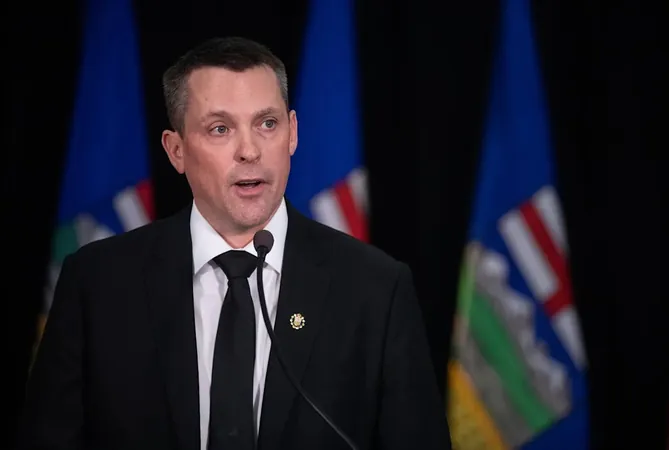
Alberta Faces Budget Crisis as Deficit Soars to $6.5 Billion Amidst Slumping Oil Prices
2025-08-28
Author: Olivia
Alberta’s Financial Troubles Deepen
CALGARY — Alberta's economic landscape is looking increasingly grim as Finance Minister Nate Horner reveals that the province's projected budget deficit has ballooned by $1.3 billion, now expected to hit a staggering $6.5 billion by the end of the fiscal year next spring.
From Surplus to Deficit
This dramatic reversal comes on the heels of an impressive $8.3 billion surplus from the previous year, showcasing a harsh reality for a province heavily reliant on oil revenue.
"We are going to have to weather some of this," Horner stated at a press conference, acknowledging both the external pressures on Alberta's economy and the challenges posed by fluctuating oil prices.
Impact of Oil Prices and Trade Uncertainties
The ongoing softening of oil prices, coupled with uncertainties stemming from U.S. trade policies and ongoing tariff disputes, has thrown Alberta's financial stability into jeopardy.
Each $1 drop in the price of oil translates to a $750 million loss for the province, and the latest forecast predicts an average price of nearly $64 per barrel for the year — significantly lower than earlier estimates.
Rising Debt and Union Negotiations
Compounding the problem, Alberta's taxpayer-supported debt has surged by $1.7 billion to reach $84.3 billion. Horner commented on the situation: "We’re experiencing many pressures on the economy that are outside of our control."
With nearly $650 million added in expenses due to agreements with unions, the province is also negotiating new contracts with key groups, including Alberta teachers and public sector employees.
Looking Ahead: Spending Cuts and Tax Breaks
While Horner remains noncommittal about potential program cuts, he hinted at possible spending targets for ministries as part of next year's budgeting process. This strategy echoes federal government's approach to fiscal management.
Adding to the complexity, Alberta's United Conservative government will honor its pledge from the 2023 election to reduce personal income taxes, a move expected to cut revenue by about $1 billion.
Long-Term Outlook Remains Bleak
Looking ahead, Alberta's financial challenges are projected to persist, with multibillion-dollar deficits anticipated through the next provincial election in 2027.
Opposition finance critic Court Ellingson pulled no punches, labeling the budgetary issues as "fiscal incompetence," and critiquing the government's handling of the economy.
As Alberta navigates these turbulent waters, residents and lawmakers alike are left wondering how to stabilize the province's economic outlook amidst such uncertainty.









 Brasil (PT)
Brasil (PT)
 Canada (EN)
Canada (EN)
 Chile (ES)
Chile (ES)
 Česko (CS)
Česko (CS)
 대한민국 (KO)
대한민국 (KO)
 España (ES)
España (ES)
 France (FR)
France (FR)
 Hong Kong (EN)
Hong Kong (EN)
 Italia (IT)
Italia (IT)
 日本 (JA)
日本 (JA)
 Magyarország (HU)
Magyarország (HU)
 Norge (NO)
Norge (NO)
 Polska (PL)
Polska (PL)
 Schweiz (DE)
Schweiz (DE)
 Singapore (EN)
Singapore (EN)
 Sverige (SV)
Sverige (SV)
 Suomi (FI)
Suomi (FI)
 Türkiye (TR)
Türkiye (TR)
 الإمارات العربية المتحدة (AR)
الإمارات العربية المتحدة (AR)